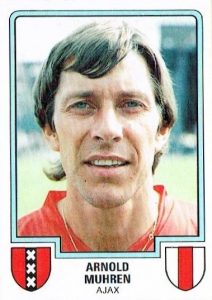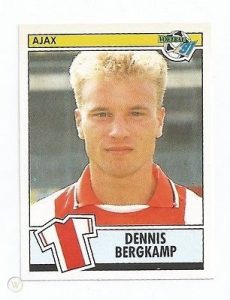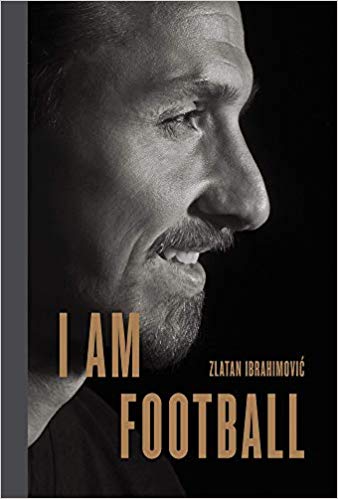Book Review – Basta: My Life, My Truth by Marco van Basten
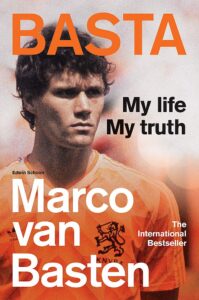 Whether or not you followed Marco van Basten’s career, his is a name that is universal in football. Three-time Ballon d’Or winner, FIFA World Player of the Year, European Championship winner and scorer of arguably the best Euros goal ever, van Basten is synonymous with the beautiful game. Whilst my own footballing baptism just misses out on van Basten’s playing days, it’s impossible not to have heard of him and have seen at least one of his goals. My knowledge of him beyond this very basic level, though, is unquestionably lacking, so I was intrigued to read his recent autobiography – Basta: My Life, My Truth.
Whether or not you followed Marco van Basten’s career, his is a name that is universal in football. Three-time Ballon d’Or winner, FIFA World Player of the Year, European Championship winner and scorer of arguably the best Euros goal ever, van Basten is synonymous with the beautiful game. Whilst my own footballing baptism just misses out on van Basten’s playing days, it’s impossible not to have heard of him and have seen at least one of his goals. My knowledge of him beyond this very basic level, though, is unquestionably lacking, so I was intrigued to read his recent autobiography – Basta: My Life, My Truth.
What becomes abundantly clear in the opening chapters is that despite van Basten’s successes, a serious ankle injury as early as 1986 significantly hampered not only his football but his life. A seemingly innocuous challenge in December 1986 was initially pooh-poohed following an X-ray, with a prognosis of ‘it’s nothing serious, just give it time’. Van Basten continued to play through the pain barrier, but fast-forward ten years, multiple failed surgeries, and van Basten’s only option was ankle fusion, which meant the end of his footballing career at the age of 31. Yet in the decade in which he played with an increasingly damaged ankle, he won the UEFA Cup Winners’ Cup, three Serie A titles, two Italian Super Cups, two European Cups, two European Supercups and two Intercontinental Cups, as well as a string of individual awards that culminated in his being honoured as the world’s best player. Remarkably, his goal in the Euro 1988 Final that would become the image of the Euros for decades to follow came just months after the first operation on his beleaguered ankle. And van Basten actually credits that injury when remarking on the goal: ‘Since…that operation in November ’87, I had reduced mobility there and could no longer take on such a ball at full power. With a good ankle I would very probably never have scored.’ Of the shot itself, he is similarly philosophical: ‘As the cross came down, I thought, okay, for heaven’s sake just smash it at the goal. I haven’t got the energy to do anything else with it.’ It’s an eye-opening insight into one of the best goals of all time and satisfying to know that amateur players the world over who’ve found themselves in the same situation, thinking just smash it, aren’t entirely removed from one of the best players and one of the best goals in the world – albeit such shots up and down the country often end in Row Z – that’s where the difference emerges.
Van Basten’s autobiography takes readers through his early days, from Ajax to Milan, and on to coaching, management and his role at FIFA, but that early acknowledgement in the book of his ankle injury casts a shadow over everything. And the man himself ponders the question of what if? Van Basten’s successes nonetheless pit him as one of the game’s greats, but with the injury holding him back, it is fair to wonder if his career may have even gone to another level had circumstances been different. And there’s both a certain wistfulness and agony to van Basten’s questioning.
In general, he comes across in the book as fiercely determined and focused but also somewhat aloof and unyielding, not one to skirt difficulties or challenges or curb his opinion, which makes for an interesting read. As too do van Basten’s reflections on subjects such as the art of taking a penalty, the striker’s mindset in a one v one and young v experienced players. Similarly, his thoughts on Johan Cruyff, his teammates and clubs are all really compelling. And there is a certain style to the autobiography, in the way the narrative is structured and the short chapters, that makes it a really enjoyable reading experience.
One thing that particularly grabbed my attention was the mention van Basten makes of the years’ worth of records he kept right from his earliest playing days, and whilst there are a few brief snippers, I couldn’t help thinking how intriguing these would be in and of themselves. For now, however, van Basten’s autobiography will suffice, and it does so satisfyingly, giving a very clear depiction of the character of a man who reached the top of the game while carrying a debilitating injury. Whether you call it stubbornness, mettle or fortitude, or a combination of all three, van Basten secured much of his legacy with only one fully functioning foot. Just imagine his legacy if he’d had two!
Jade Craddock
(Cassell. November 2020. Hardcover: 352 pages)
 If you engaged a football fan in word association, throwing them the name ‘Johan Cruyff’, the most expected response would be ‘Ajax’, the club he successfully played and managed and with which he is most readily associated. You might also get a few replying ‘Holland’, ‘Total Football’ or ‘14’ the number famously worn by the Dutch legend, or even ‘Barcelona’, like Ajax a club he won honours with both as a player and coach. Some may even respond ‘turn’ as in the ‘Cruyff Turn’, which originated when he twisted Swedish defender Jan Olsson inside out during their World Cup game in 1974. What is highly unlikely is that any would be prompted to say ‘Feyenoord’ – the reason? Well, Cruyff’s farewell season in 1983/84, playing for the Rotterdam based club, despite the club winning the ‘double’ (Eredivisie and KNVB Cup), is largely forgotten about, amongst all else that Cruyff achieved. Andy Bollen’s Fierce Genius: Cruyff’s Year at Feyenoord, therefore, is a welcome window on this period about Amsterdam’s most famous footballing son.
If you engaged a football fan in word association, throwing them the name ‘Johan Cruyff’, the most expected response would be ‘Ajax’, the club he successfully played and managed and with which he is most readily associated. You might also get a few replying ‘Holland’, ‘Total Football’ or ‘14’ the number famously worn by the Dutch legend, or even ‘Barcelona’, like Ajax a club he won honours with both as a player and coach. Some may even respond ‘turn’ as in the ‘Cruyff Turn’, which originated when he twisted Swedish defender Jan Olsson inside out during their World Cup game in 1974. What is highly unlikely is that any would be prompted to say ‘Feyenoord’ – the reason? Well, Cruyff’s farewell season in 1983/84, playing for the Rotterdam based club, despite the club winning the ‘double’ (Eredivisie and KNVB Cup), is largely forgotten about, amongst all else that Cruyff achieved. Andy Bollen’s Fierce Genius: Cruyff’s Year at Feyenoord, therefore, is a welcome window on this period about Amsterdam’s most famous footballing son.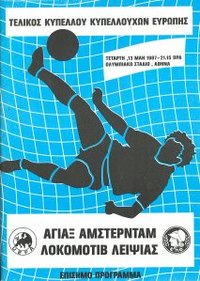
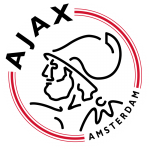 Ajax revive their traditions
Ajax revive their traditions Their opponents were 1. FC Lokomotive Leipzig, a solid if unimaginative team from the German Democratic Republic (East Germany) with an excellent goalkeeper in René Müller. They made unspectacular but solid progress, beating Glentoran FC of Northern Ireland 3-1 and, in the Second Round, raised a few eyebrows by eliminating SK Rapid Wien after extra-time. The draw gave them FC Sion in the quarter-finals, and they beat the Swiss 2-0. A curious semi-final against Girondins de Bordeaux produced two 1-0 away wins and victory for Lokomotiv in a penalty shoot-out.
Their opponents were 1. FC Lokomotive Leipzig, a solid if unimaginative team from the German Democratic Republic (East Germany) with an excellent goalkeeper in René Müller. They made unspectacular but solid progress, beating Glentoran FC of Northern Ireland 3-1 and, in the Second Round, raised a few eyebrows by eliminating SK Rapid Wien after extra-time. The draw gave them FC Sion in the quarter-finals, and they beat the Swiss 2-0. A curious semi-final against Girondins de Bordeaux produced two 1-0 away wins and victory for Lokomotiv in a penalty shoot-out.